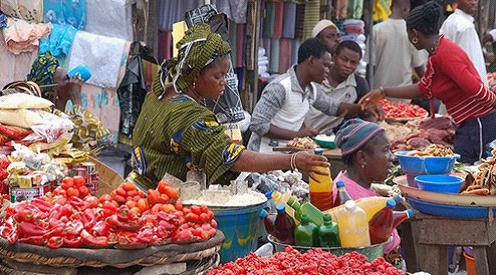From available records, Nigeria is experiencing one of the worst cost-of-living crises in a generation, with inflation at 40.87 per cent in June 2024, the highest in 28 years. The increase in food prices has been largely attributed to the depreciation of the Naira, conflicts in food-producing regions and the soaring transportation expenses.
The Central Bank has also confirmed that new inflationary trends are emerging, extending beyond the traditional monetary factors. This is worrisome.
There are many kinds of inflation, but for this discourse, we are focusing on food inflation. This is because food inflation accounts for a bulk of Nigeria’s inflation basket, which rose in the previous month with high food prices and a weaker naira.
According to economists, the rise in the prices of key food commodities is mostly caused by insecurity, high cost of transportation of products, climate change and the instability of the foreign exchange rate of the Naira.
A common narrative among households these days is the issue of the prohibitive cost of food and other survival strategies. This is borne out of the fact that expensive food has a direct cost on lower-income owners, many of whom are unable to increase their wages to offset the rising cost of living.
As it would appear, the Nigerian economy has defied all known economic theories to solve the problem confronting the nation. And in what looked like passing the buck, an agency of the Federal Government, the Federal Competition Consumer Price fixing Commission (FCCPC) says that disproportionate pricing of imported goods, mostly among retailers, is responsible for inflation in consumer goods in the country.
In a statement by the FCCPC’s Executive Chairman and Chief Executive Officer, Tunji Bello, the Commission plans to engage with market leaders to check exploitative pricing across the country. According to the statement, the Commission stated that by collaborating with market leaders, it is confident that a product pricing to avoid excessive profiteering at the expense of consumers would be arrived at.
The Agency said that it recognised that prices charged are, in most cases, disproportionate for imported products and excessive for locally produced ones.
A concerned citizen who spoke on this issue said that Nigerians are not patriotic enough on this issue, asking, “How can one explain the high cost of yams and cassava in our markets now?’’
He agreed that prices can go up because of some of the government policies, but not to a very large extent, so that a tuber of yams goes for as high as N8,000 and a basin of garri, only God knows how much.
He noted that this is an unfair practice and that it is prevalent in the retail segment of the distribution chain, where some market associations are engaged in price fixing at the expense of consumers, adding that by so doing, the traders have become agents of inflation. He condemned this act, which he described as reprehensible, unethical, exploitative and illegal.
Another respondent, Mrs Theresa Achonu, said that the market unions and associations are very powerful and most times act beyond the government of the day. She said that the market associations decide what happens in the markets and that it is either you comply or go.
She said that almost everything sold in the market, including crayfish, tomatoes, vegetables, and garri, has strong unions and ‘’you must belong to the union before you are allowed to sell in the market.’’
Mrs Achonu said that the associations decide what happens and fix prices of commodities in the markets, and ‘’you must comply or go and that it is not easy to fight them because most of them belong to political parties and other bodies that one does not know.’’ She asked, “Do you know how and when prices of commodities are fixed uniformly overnight?
The woman suggested a situation where the Government Agency can penetrate various unions and associations to discuss the way forward, saying that the associations are far stronger than any agency of the government, and nobody knows where they derive their powers.
She said that notwithstanding, the government can have its way if it is determined to break the jinx of indiscriminate price fixing and exploitation of consumers, adding that most of the associations are registered and somehow covered by law and asked, Who registered them? Is it not the same government? Why can’t they stop them if they are operating outside the framework of the law that established them?’’
A Youth Corper in Asaba, Musa Mohammed, who said that inflation is a sustained increase in prices of goods and services which negatively impacts purchasing power and leads to tough financial decisions for consumers, opined that Nigeria’s unprecedented inflation is a case of multiple factors and if not addressed fast, is capable of spelling doom for the nation.
Also, a retired banker who does not want his name in print said that in modern times, the preferred method of controlling inflation is through monetary policies imposed by the nation’s central bank. The next, he said, as an alternative is a cap on prices, which does not have a great record of success. In either case, he stressed that soft language is hard to pull off.
He also suggested some interventions by the government to help bring down prices of goods and services, such as price controls as an economic policy to be imposed by the government by setting up minimum and maximum prices of goods and services. ‘’Price control intends to make necessary goods and services more affordable for consumers. Such interventions can break monopolies, regulate prices and improve consumer choices,’’ he emphasised.
From all indications, food inflation is bad and should not be allowed in the country. We are, however, optimistic that the government can fight and win the battle against the enemies of food in our society.


